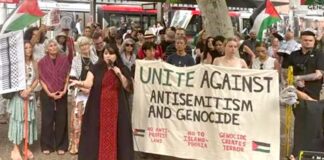The US has blamed Hamas for causing Israel’s assault. Kevin Rudd has called them a “terrorist organisation”. In fact Hamas are the legitimate elected leaders of the Palestinians.
Their support has grown at the expense of Fatah, the party which emerged to lead the Palestinians out of the national liberation struggles of the 1960s.
The Palestinians are a people dispossessed from their lands. Many of them have lived for generations in crowded refugee camps. They are subject to daily humiliation at the hands of Israeli occupying soldiers, and have faced continual military assaults from the Israeli army. In Gaza 80 per cent of the population relies on food aid from the UN to survive.
Yet Palestinians in the Occupied Territories have put up heroic resistance to the illegal Israeli occupation. Hamas was founded during the first Palestinian uprising, or intifada, in 1987.
The intifada was a movement of a whole people in revolt against poverty and oppression. It involved not only about military clashes but strikes, marches and co-ordinated acts of civil disobedience.
It was this uprising that forced Israel into the Oslo negotiations.
But Fatah, which led the negotiations, was discredited by the continual compromises with Israel this involved, which delivered Palestinians nothing. The hope that Israel would agree to a peace deal where Palestinians would be given control of lands in the Occupied Territories was an illusion.
All through the Oslo negotiations in the 1990s Israel built more settlements in the Occupied Territories and tightened its military control over the daily lives of Palestinians. Living standards collapsed as Israel prevented Palestinians travelling from their homes to jobs inside Israel.
Hamas rejected the Oslo Accords as a dead end. As a result it won the elections for control of the Palestinian Authority that governs the West Bank and Gaza in 2006.
The West responded by refusing to acknowledge the Palestinians’ democratic choice. Israel withheld tax revenues due to the Palestinian Authority, and encouraged other governments to withhold aid.
Then Israel and the US supported a coup by Fatah in the West Bank to topple the Hamas government. Hamas was able to prevent a similar attempt in the Gaza strip.
Israel has since tightened its blockade of Gaza, restricting supplies of fuel, medicines and food. This is a policy of collective punishment of the entire civilian population, designed to force them to abandon Hamas.
How can Palestine be free?
Despite Hamas’ refusal to capitulate to Israel, the Gaza Strip remains isolated and surrounded by hostile forces. Hamas cannot militarily defeat Israel. On their own, the Palestinians lack the economic or military power to take on Israel—a state armed and backed by the US.
Israel’s defeat by the Lebanese resistance group Hizbollah in 2006 showed that Israel and its backers could be beaten by wider forces.
The onslaught on Gaza has triggered mass demonstrations across the region. In Egypt “up to a quarter of a million people took part in the first two days of demonstrations,” according to Egyptian socialist Hossam el-Hamalawy.
Egyptian activists have organised aid caravans to Rafah, where the Egyptian government has colluded with Israel by sealing the border with the Gaza strip.
Early last year Palestinians broke through the border with Egypt and demanded food, water and supplies.
This triggered mass protests of solidarity across Egypt and shook Hosni Mubarak’s pro-US regime.
What worried Mubarak and his allies in the US and Israel was the possibility of the Palestinian liberation struggle becoming tied to the Egyptian resistance and workers’ movement.
Freedom for Palestine relies on such a wider regional uprising to topple the corrupt Arab regimes. The ruling class in countries like Egypt have no interest in fighting imperialism—they have grown rich through making their peace with the US and Israel while the mass of the population remains very poor.
But the working class inside Egypt and across the Middle East has both an interest and the power to successfully challenge imperialism.
It is workers who keep the oil flowing through the pipelines of Saudi Arabia and Iraq, workers who take ships along the Suez Canal, workers who bake bread, drive trains, serve fries at McDonald’s and sweep the floors of tourists’ hotel rooms.
This labour supports the economy of every Middle Eastern state, and therefore the stability of every Middle Eastern government.
Recent years have seen the revival of workers’ strikes in Egypt. The solidarity on display in the current wave of protests in defence of Gaza can be the basis for constructing a workers’ movement across the Middle East that can finally bring liberation—for Palestine and the whole region.
By James Supple





